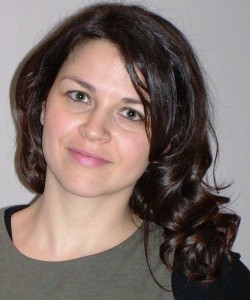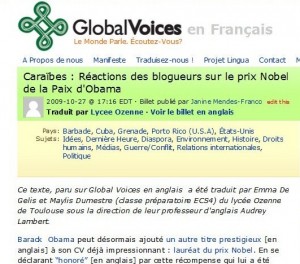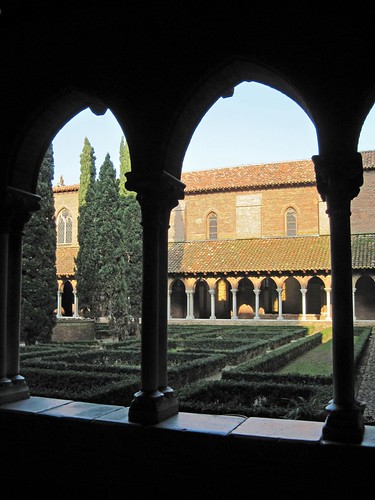Audrey Lambert teaches English to advanced students of the Lycée Ozenne, a public high school in the capital town of south-west France, Toulouse. A faithful volunteer translator at Global Voices in French since 2008, she is also a pioneer of using Global Voices in the classroom, where it has now been part of her students’ advanced English curriculum for two years.
Traditional question: how did you discover Global Voices?
I stumbled upon Global Voices in French by chance and was happy to see everyone could contribute. I find translating a very stimulating exercise. Very tricky sometimes, but it brings enormous satisfactions when you finally crack it. Plus, I've been made to feel welcome by a very warm community (Note: how could we edit this? Audrey likes us!). In 2008, I've taken it a step further and asked my students to translate blog posts into French, as part of their translation exercises.
My students have completed high-school, they are training for very competitive and difficult exams to get into “Les grandes écoles“, the French “elite” schools. A high level of English and news literacy is required of them, they will be evaluated on both. For instance, we listen to radio news in English during my classes. At their level, they have no real problems with the source vocabulary. What is difficult to achieve with Global Voices, compared to other translations of mainstream media articles they have to do, is to recreate in French the looser style of writing on blogs, the bloggers’ tone, personality, jokes, slang.
Which routine did you set up? Do they enjoy it?
It certainly makes a change from their regular English curriculum, which is very scholastic and focused on exams. I have tested a number of methods: one post per student, or one post translated by many students. This year, they work in pairs. They chose themselves what they want to translate, deadlines are after school holidays or long weekends. Translations have to be handed in by email. We've set up a special user account on Global Voices in French to publish their translations (see last year's and this year's). In a way, they have produced something unique, so they are credited. To see their work and their name on the Web is a real incentive, some are very impatient to see it live on the Web.
Would you recommend this experiment to other teachers?
To be honest, be prepared for a lot of work! I'm sometimes overwhelmed when, on top of everything else, I get fifteen translations by email to read, comment and edit. But it truly is a very rewarding experiment, I do recommend it to other teachers. It builds a more personal relationship with students, I get to know them a little better from the posts they pick. I do not grade their translations, which makes for a more relaxed teacher-student relationship.
How are citizen news media perceived in a French scholastic environment?
Teachers of advanced classes are pretty free to chose the material we work on. I informed the inspectorate at the beginning of this experiment and it was well received. As for myself, translating for Global Voices taught me a great deal on a linguistic as well as a cultural level. I've had access to news never (or seldom) covered by traditional media. I see citizen media as a considerable advancement in democracy. Blogs bring a new perspective, a personal view on a wide variety of subjects.
Was your true calling languages or teaching?
I always wanted to teach. As a kid, I taught my dolls and teddy bears. I fell in love with English when my mum – who lived for 8 years in South Africa – taught me English songs for children. Later, I had to chose between English and Spanish, which I also love. I majored in English literature, with a graduation paper on the myth of the Amazon in Elizabethan literature! I love reading contemporary literature in English and would love, one day, to translate into French one of my favorite novels. But time is tight, and for the moment, I dedicate myself to my other passion: advocacy for animals. My dream is to have the opportunity to live close to primates…










6 comments
Wow- such a great idea and lovely way of involving students in the community.
I love this!
Truly inspiring, thank you Claire and Audrey!
Thanks Audrey and all the best! And thank you Claire for introducing us to a star!
Thank you for everything Audrey, the student collaboration is such a great idea.
Brilliant idea Audrey and a big up to your students! Thank you both of you for this inspiring interview. Keep up the good work.
Dear Audrey,
Thanks for all your Global Voices translation and greetings from Berkeley! I’m curious how the open, free, “edit this page” World University & School – http://worlduniversity.wikia.com/wiki/World_University potentially in all languages as separate schools and universities, with all its many resources, might be helpful to you or your students. I think it will become a French school or university. How might you students teach to their web cameras and post it to WUaS? The budding music school is an example of people teaching to their web cameras: http://worlduniversity.wikia.com/wiki/Music. And how might, too, they begin to aggregate all the free open, great teaching and learning content in the French language?
Sincerely,
Scott
http://scottmacleod.com